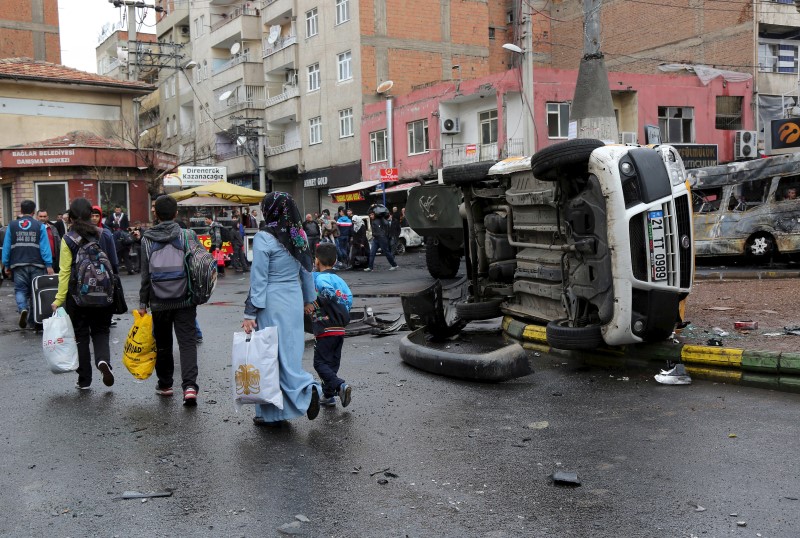By Seyhmus Cakan
DIYARBAKIR, Turkey (Reuters) - Fighting between Turkish security forces and Kurdish militants spread on Tuesday, with tanks, helicopters and armoured cars deployed after a suicide bombing that killed 37 people in the capital Ankara.
The deadliest violence took place in Diyarbakir, the largest city in mainly Kurdish southeastern Turkey, where Kurdistan Workers Party (PKK) fighters blocked roads and clashed with security forces overnight as a police helicopter flew overhead, witnesses said.
One police officer and three militants were killed in Diyarbakir and a second police officer was killed in the town of Nusaybin, where the PKK launched an attack, security sources said.
No one has claimed responsibility for Sunday's car bomb that tore through a crowded transport hub in Ankara, but security officials have blamed two members of the outlawed separatist PKK.
Violence has surged in southeastern Turkey since a 2-1/2-year PKK ceasefire collapsed in July. The militants have focused their strikes on security forces in towns in the region, some of which have been under curfew.
A curfew was imposed in part of Diyarbakir from 3 a.m. (0100 GMT) after militants began to set up barricades, dig ditches and plant explosives, authorities said.
The curfew was widened to encompass more city streets as clashes continued in the morning. Gunfire and explosions rang out across the city. Police in armoured vehicles positioned on street corners called for people to stay inside.
Elsewhere in the southeast, tanks at military bases in the town of Sirnak fired shells at ditches and barricades, according to witnesses who saw smoke rising from the shelled areas as gunfire and blasts resounding around the town.
The Turkish military responded to the Ankara bombing by launching air strikes on Monday, hitting northern Iraq's Qandil mountain area where the PKK's main bases are. The military estimated it had killed 45 PKK militants, destroyed two weapons depots and two Katyusha rocket positions.
President Tayyip Erdogan has called for members of parliament from the pro-Kurdish Peoples' Democratic Party (HDP) to face prosecution, accusing them of being an extension of the PKK, which is designated a terrorist group by Turkey, the United States and the European Union.
Speaking on Monday evening, Erdogan said the definition of terrorist needed to be broadened to include supporters.
"It may be the terrorist who detonates bombs and pulls the trigger, but it is these supporters who enable them to achieve their goals," he said in a speech.

"Being an MP, an academic, journalist, writer or civil society group executive does not change the reality of that person being a terrorist," he said.